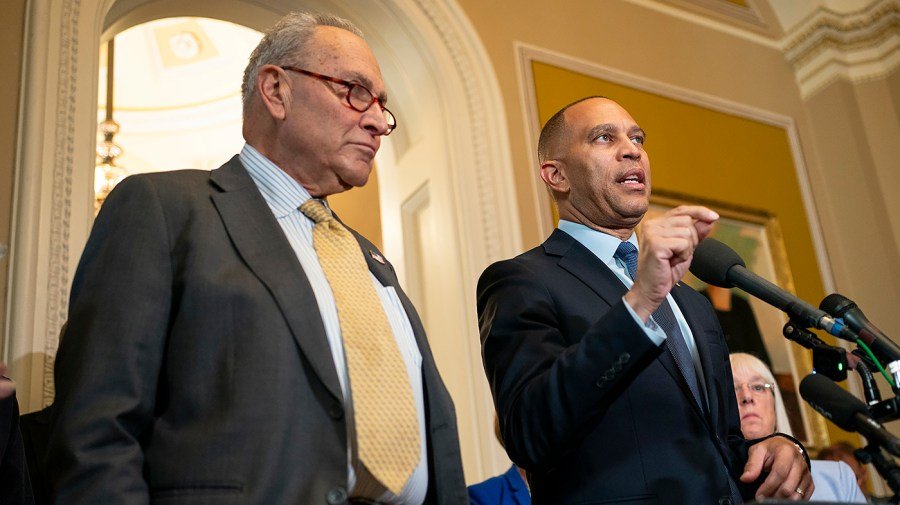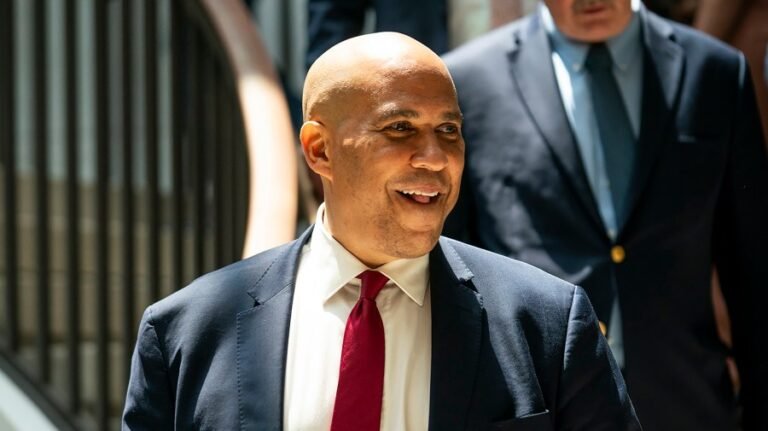
House Democrats are hanging their hopes on party leaders in the Senate to block any government spending bill crafted solely by the GOP, but there’s plenty of distrust between the chambers hovering over the debate.
Behind House Minority Leader Hakeem Jeffries (D-N.Y.), House Democrats were virtually united against a Republican spending bill in March, only to watch angrily as Senate Minority Leader Charles Schumer (D-N.Y.) and a small group of upper chamber Democrats backed the bill, sending it to President Trump’s desk.
With another shutdown deadline looming at month’s end, House Democrats are delicately predicting a different outcome this time, arguing that the political environment has changed so drastically over the past six months that Schumer has almost no choice but to oppose a GOP spending bill negotiated without Democratic input.
“The world has literally changed since that occurred,” Rep. Donald Norcross (D-N.J.) said. “He made a calculated risk and it did not turn out well. I don’t think he’ll make that mistake twice.”
“I think they hold the line,” echoed Rep. Adriano Espaillat (D-N.Y.). “The American people have expressed themselves clearly and loudly that they want us to fight back at all levels. And if, in fact, we engage in a shutdown, it would be a Republican shutdown, because they’re the ones that are making it difficult for anybody to reach an agreement with these egregious cuts.”
Not everyone, however, is so confident.
House Democrats, including top leaders, had made similar arguments in March when they urged their Senate counterparts to hold firm and oppose the Republican bill, as they had done. Schumer ultimately dismissed those calls, saying a shutdown would be more harmful than enactment of the Republican bill.
His decision infuriated Democrats of all stripes, on and off of Capitol Hill. And now, heading into the Sept. 30 shutdown deadline, some Democrats voiced fears that a similar scenario could play out this month.
“We’re not going to vote for a bad budget, we’re just not going to do it. We’ll hold the line here and, of course, we’re afraid that once again the Senate will cave,” said Rep. Juan Vargas (D-Calif.). “It’s unfortunate, but I think that’s what the reality is.”
Schumer, for his part, has taken aggressive steps to reassure the Democratic skeptics that he’s on their side, bashing Republican leaders for going it alone and warning that a GOP funding bill without Democratic buy-in only heightens the odds of a shutdown.
“The only way to avoid a shutdown is to work in a bipartisan way, with a bill that can get both Republican and Democratic votes in the Senate,” Schumer wrote Tuesday in a letter to fellow Democrats.
Schumer’s threat has real teeth because, unlike in the House, where Republicans can pass legislation with a simple majority, the Senate filibuster demands that GOP leaders win over at least some Democratic senators to approve bills — if Schumer chooses to use it.
“We Democrats want a bipartisan bill, and we are pushing the Republicans very hard to do it. We’re on our front foot, we’re unified, we’re strong on health care. They’re all divided and fighting with each other,” Schumer told reporters later in the week.
“It’s much different than last time,” he continued. “People now know … how bad Trump is.”
House Democrats also see this month’s battleground as dramatically altered relative to the March spending debate. For one thing, Trump’s repeated push to claw back funds already allocated by Congress has soured relations between the parties and sown a deep distrust among Democrats that the president and his Republican allies are negotiating in good faith.
“They’re completely uninterested in giving Democrats anything, … which is why Democrats are wildly naive to think that if we go along with them it’s going to somehow be better. It won’t be,” Rep. Jared Huffman (D-Calif.) said. “They’re just going to do it on their terms without us, and anything we do to help them will just be used against us.”
Huffman said the Republicans’ actions since the March spending debate, including the GOP push for rescissions, “validated” the opposition from House Democrats at the time — and heightens the odds that House and Senate Democrats will be on the same page this time around.
“That was a hot stove that he touched,” Huffman said of Schumer. “I’ve got to believe that all Democrats — including Chuck Schumer — understand whatever wishfulness led them to think that that could produce a better outcome, the Republicans have just burned it all to the ground.”
Another factor differentiating the current fight from that in March relates to the Affordable Care Act. In 2021, Democrats adopted new tax credits for certain patients under former President Obama’s signature health care law, and the next year they extended those subsidies through 2025. With that deadline fast approaching, even some Republicans are clamoring for Congress to extend those benefits once again, if only until after the 2026 midterm elections.
If that extension is not included in this month’s government spending package, some Democrats said, that would give Schumer plenty of political cover to oppose the legislation and force Republicans to the negotiating table without fear of a political backlash, even if a temporary shutdown resulted.
“If we don’t address that in this budget in this coming month, that means people will lose their health insurance, everybody’s health insurance premiums are going to go up. And that to me is a red line,” Rep. Seth Magaziner (D-R.I.) said.
“It’s something we have to deal with, and we cannot let the Republicans gut the health care system under the guise of continuing to fund the government,” he added. “So I think that this time around, it’s clear to me what this fight is about. … And I think that Schumer — or I should say, I hope that Schumer — understands the importance of that.”
Jeffries has also emphasized the health care piece of the budget debate, saying cuts to benefits are “a clear red line.”
“We will not support a partisan Republican spending bill that guts health care from the American people,” he said Thursday. “Period, full stop.”
Even those voicing the loudest distrust in Schumer to hold the line noted that the internal fire he took for breaking with his party to support the Republicans’ agenda was so intense that he’s much less likely to do it again.
“He got so much push back, and really people were so angry with him, that this time I think he’s really going to think twice about caving,” said Vargas. “He got beat up badly, not only here but also across the country, by Democrats who wanted to see a fight.
“We were ready for a fight, and instead he waved the white flag very quickly,” he added. “And we don’t want to see that white flag. We want to see a fight.”


